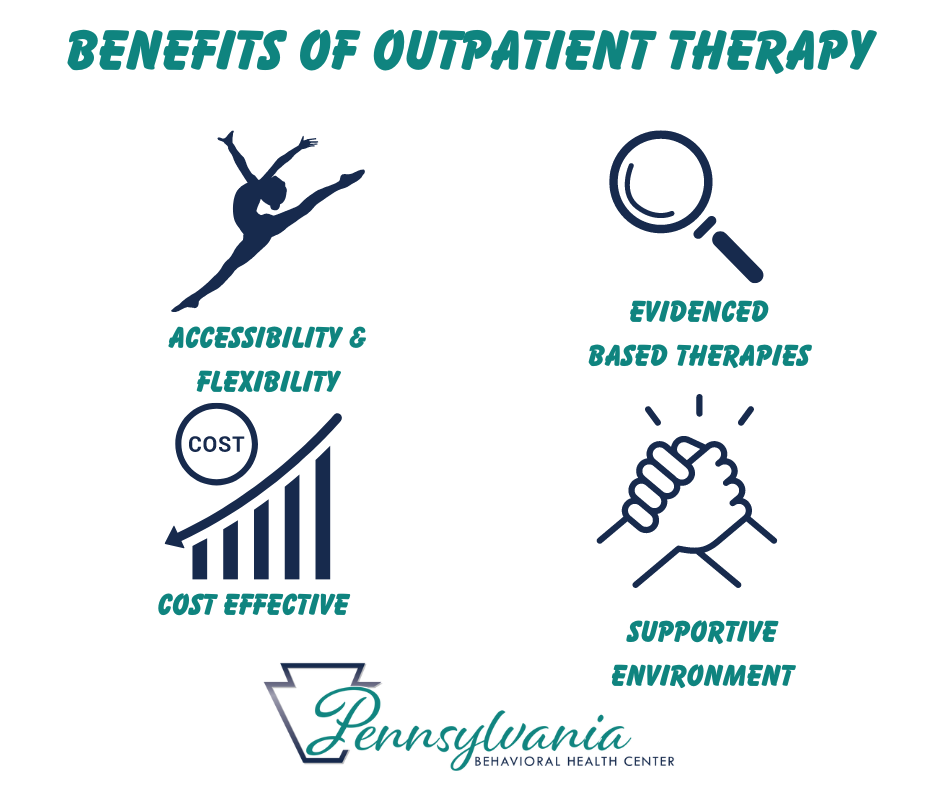Understanding the Benefits of Outpatient Therapy

Mental Health Benefits
Outpatient therapy is a valuable resource for individuals seeking mental health treatment. Whether you’re struggling with anxiety, depression, or any other mental health condition, outpatient therapy can provide a safe and supportive environment to address your concerns and work toward healing and recovery.
At Pennsylvania Behavioral Health Center we understand how hard it is to reach out for help. It might seem like there is no hope, but rest assured we will be with you from the first call to guide you on your journey to the best version of yourself. Mental heath disorders are not the end of your life. They can be managed with the right combination of therapy, support, and medication.
Here are some of the benefits of outpatient therapy:
Accessibility and Flexibility: Outpatient therapy offers a more flexible approach to treatment compared to inpatient care. You can attend therapy sessions while still maintaining your regular daily routine and responsibilities, such as work or school. It’s also typically more accessible, as there are more outpatient therapy clinics and providers available than inpatient facilities.
Evidence-Based Therapies: Outpatient therapy is often grounded in evidence-based therapies that have been shown to be effective in treating mental health conditions. These therapies can include cognitive-behavioral therapy (CBT), dialectical behavior therapy (DBT), and acceptance and commitment therapy (ACT), among others. These therapies focus on developing skills to manage symptoms, improve coping mechanisms, and change negative thinking patterns.
Supportive Environment: Outpatient therapy provides a supportive and non-judgmental environment where individuals can share their struggles and receive compassionate care. This can be especially important for those who may not have a strong support system in their personal lives.
Cost-Effective: Outpatient therapy is generally more cost-effective than inpatient care, as it does not require overnight stays or the same level of medical attention. Insurance companies may also cover a portion of the cost of outpatient therapy, making it a more affordable option for those seeking treatment.
Studies have shown the effectiveness of evidence-based therapies in outpatient settings. For example, a meta-analysis of CBT for depression found that CBT was significantly more effective than control conditions in reducing depressive symptoms (Hofmann et al., 2012). Similarly, a randomized controlled trial of DBT for borderline personality disorder found that DBT was effective in reducing self-harm behaviors and suicide attempts (Linehan et al., 2006).
It’s important to note that while outpatient therapy can be a highly effective form of treatment, it may not be the best fit for everyone. Those with more severe or acute mental health conditions may require a higher level of care, such as inpatient hospitalization.
If you’re considering outpatient therapy, it’s essential to find a provider who is experienced in evidence-based therapies and who you feel comfortable working with. You can ask for recommendations from your primary care provider or call Pennsylvania Behavioral Health Center at 610-563-2752.
In conclusion, outpatient therapy is a valuable resource for individuals seeking mental health treatment. With evidence-based therapies, a supportive environment, and accessibility and flexibility, outpatient therapy can be a highly effective way to manage symptoms and work toward healing and recovery.
References:
Hofmann, S. G., Asnaani, A., Vonk, I. J., Sawyer, A. T., & Fang, A. (2012). The efficacy of cognitive behavioral therapy: A review of meta-analyses. Cognitive Therapy and Research, 36(5), 427-440.
Linehan, M. M., Comtois, K. A., Murray, A. M., Brown, M. Z., Gallop, R. J., Heard, H. L., … & Lindenboim, N. (2006). Two-year randomized controlled trial and follow-up of dialectical behavior therapy vs therapy by experts for suicidal behaviors and borderline personality disorder. Archives of General Psychiatry, 63(7), 757-766.
o.

